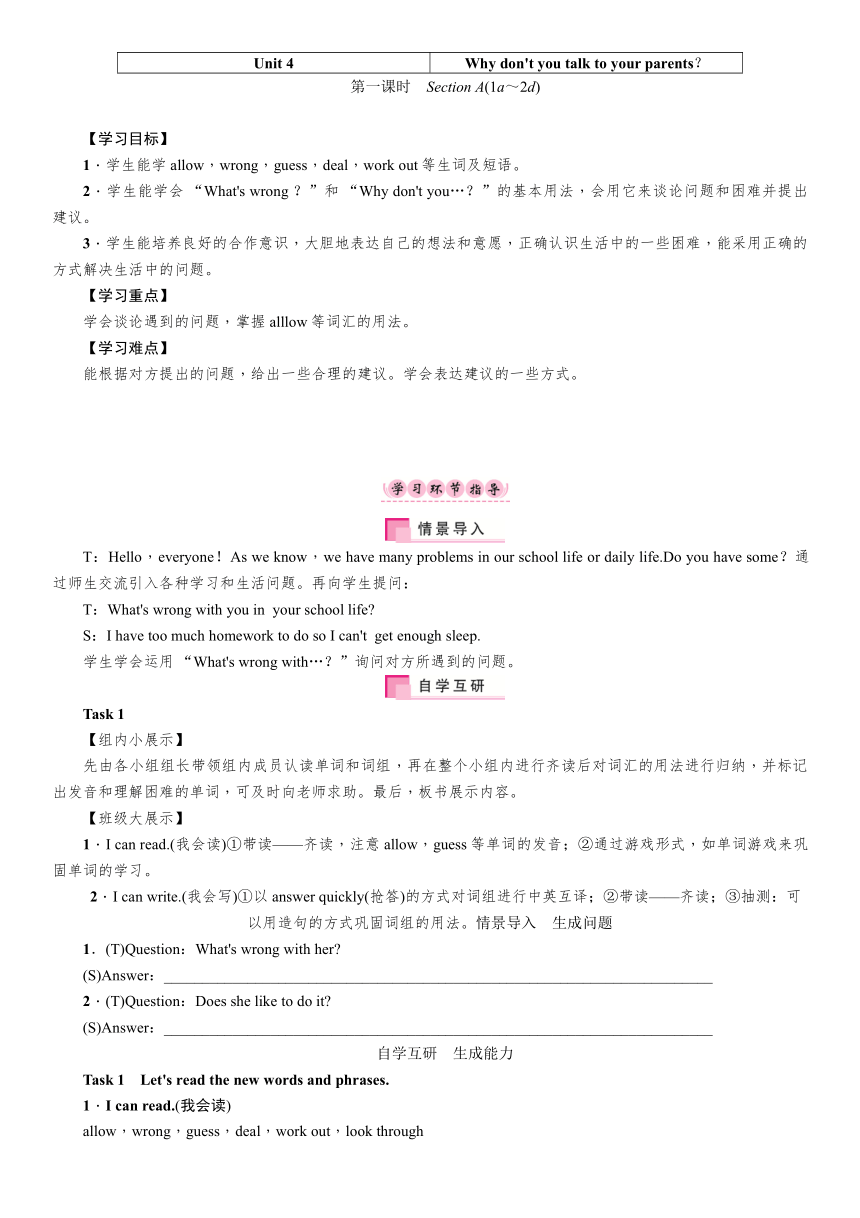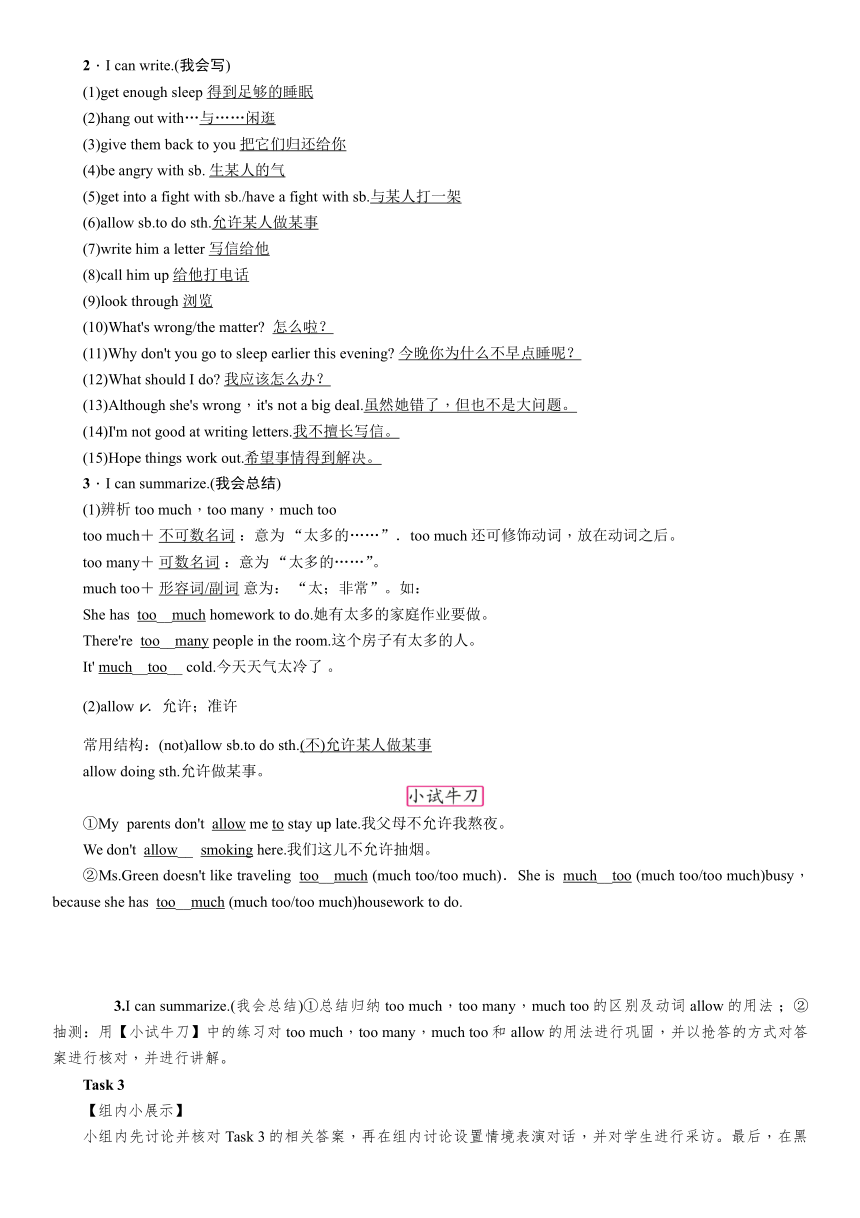Unit 4 Why don't you talk to your parents?Section A(1a~2d) 教案
文档属性
| 名称 | Unit 4 Why don't you talk to your parents?Section A(1a~2d) 教案 |  | |
| 格式 | doc | ||
| 文件大小 | 112.0KB | ||
| 资源类型 | 教案 | ||
| 版本资源 | 人教新目标(Go for it)版 | ||
| 科目 | 英语 | ||
| 更新时间 | 2022-05-29 08:11:31 | ||
图片预览


文档简介
Unit 4 Why don't you talk to your parents?
第一课时 Section A(1a~2d)
【学习目标】
1.学生能学allow,wrong,guess,deal,work out等生词及短语。
2.学生能学会 “What's wrong ?”和 “Why don't you…?”的基本用法,会用它来谈论问题和困难并提出建议。
3.学生能培养良好的合作意识,大胆地表达自己的想法和意愿,正确认识生活中的一些困难,能采用正确的方式解决生活中的问题。
【学习重点】
学会谈论遇到的问题,掌握alllow等词汇的用法。
【学习难点】
能根据对方提出的问题,给出一些合理的建议。学会表达建议的一些方式。
INCLUDEPICTURE"教学环节指导.TIF"INCLUDEPICTURE "../../../../../教案·8英语人教%20Word/教学环节指导.TIF" \* MERGEFORMAT
INCLUDEPICTURE"情景导入.TIF"INCLUDEPICTURE "../../../../../教案·8英语人教%20Word/情景导入.TIF" \* MERGEFORMAT
T:Hello,everyone!As we know,we have many problems in our school life or daily life.Do you have some?通过师生交流引入各种学习和生活问题。再向学生提问:
T:What's wrong with you in your school life
S:I have too much homework to do so I can't get enough sleep.
学生学会运用 “What's wrong with…?”询问对方所遇到的问题。
INCLUDEPICTURE"自学互研.TIF"INCLUDEPICTURE "../../../../../教案·8英语人教%20Word/自学互研.TIF" \* MERGEFORMAT
Task 1
【组内小展示】
先由各小组组长带领组内成员认读单词和词组,再在整个小组内进行齐读后对词汇的用法进行归纳,并标记出发音和理解困难的单词,可及时向老师求助。最后,板书展示内容。
【班级大展示】
1.I can read.(我会读)①带读——齐读,注意allow,guess等单词的发音;②通过游戏形式,如单词游戏来巩固单词的学习。
2.I can write.(我会写)①以answer quickly(抢答)的方式对词组进行中英互译;②带读——齐读;③抽测:可以用造句的方式巩固词组的用法。情景导入 生成问题
1.(T)Question:What's wrong with her
(S)Answer:________________________________________________________________________
2.(T)Question:Does she like to do it
(S)Answer:________________________________________________________________________
自学互研 生成能力
Task 1 Let's read the new words and phrases.
1.I can read.(我会读)
allow,wrong,guess,deal,work out,look through
2.I can write.(我会写)
(1)get enough sleep 得到足够的睡眠
(2)hang out with…与……闲逛
(3)give them back to you 把它们归还给你
(4)be angry with sb. 生某人的气
(5)get into a fight with sb./have a fight with sb.与某人打一架
(6)allow sb.to do sth.允许某人做某事
(7)write him a letter 写信给他
(8)call him up 给他打电话
(9)look through 浏览
(10)What's wrong/the matter 怎么啦?
(11)Why don't you go to sleep earlier this evening 今晚你为什么不早点睡呢?
(12)What should I do 我应该怎么办?
(13)Although she's wrong,it's not a big deal.虽然她错了,但也不是大问题。
(14)I'm not good at writing letters.我不擅长写信。
(15)Hope things work out.希望事情得到解决。
3.I can summarize.(我会总结)
(1)辨析too much,too many,much too
too much+ 不可数名词 :意为 “太多的……”.too much还可修饰动词,放在动词之后。
too many+ 可数名词 :意为 “太多的……”。
much too+ 形容词/副词 意为: “太;非常”。如:
She has too__much homework to do.她有太多的家庭作业要做。
There're too__many people in the room.这个房子有太多的人。
It' much__too__ cold.今天天气太冷了 。
(2)allow v.允许;准许
常用结构:(not)allow sb.to do sth.(不)允许某人做某事
allow doing sth.允许做某事。
INCLUDEPICTURE"小试牛刀.TIF"INCLUDEPICTURE "../../../../../教案·8英语人教%20Word/小试牛刀.TIF" \* MERGEFORMAT
①My parents don't allow me to stay up late.我父母不允许我熬夜。
We don't allow__ smoking here.我们这儿不允许抽烟。
②Ms.Green doesn't like traveling too__much (much too/too much).She is much__too (much too/too much)busy,because she has too__much (much too/too much)housework to do.
3.I can summarize.(我会总结)①总结归纳too much,too many,much too的区别及动词allow的用法 ;②抽测:用【小试牛刀】中的练习对too much,too many,much too和allow的用法进行巩固,并以抢答的方式对答案进行核对,并进行讲解。
Task 3
【组内小展示】
小组内先讨论并核对Task 3的相关答案,再在组内讨论设置情境表演对话,并对学生进行采访。最后,在黑板上板书展示内容。
【班级大展示】
1.I can practice.(我会练)①以抽签的形式,抽选同学翻译Take 3中的对话;②带读——齐读。
2.I can make conversations.(我会编对话)①根据任务要求编写对话;②设置情境表演对话;③根据对话内容,对同学进行随机提问。
3.I can interview and report.(我会采访和汇报)①运用所学句型 “What's wrong /the matter/the trouble?”对同学进行采访,用表格的形式展示在黑板上;②用口头汇报的形式汇报同学遇到的问题及建议。
【备注】
Task 2 Let's listen to the tape and finish 1b,2a,2b.
1.听第一遍录音,将2a中的表格填好。
2.听第二遍录音,完成2b中的匹配任务。
3.利用2a和2b信息进行对话练习,完成2c。
Task 3 Make conversations and interview.
1.I can practice.(我会练)
A:Grace,What's wrong with you
B:I__am__really__tired__because__I__studied__until__midnight__last__night. what should I do
A:Why__don't__you go to sleep earlier this evening
2.I can make conversations.(我会编对话)
Imagine you are best friends.One of you have problems.Role play a conversation between you.结合课文内容编写对话,介绍自己遇到的问题及询问建议。运用句型:What's the matter?What should I do?Why don't you…?You should…
A:Hey,Peter.What's wrong
B:I had a fight with my best friend.What should I do
A:You could write him a letter.
B:It's a good idea.But I am not good at writing letters.
A:What about calling him up
B:No,I don't want to talk to him on the phone.
A:Why don't you go to his house
B:Good idea.Thank you.
3.I can interview and report.(我会采访和汇报)
Oral report:Hello,everyone!Just now I had an interview about some people's trouble or problems.Now let me say something about them.Peter was very tired because he studied until midnight last night.I think he should go to bed earlier tonight…
交流展示 生成新知
INCLUDEPICTURE"交流预展.TIF"INCLUDEPICTURE "../../../../../教案·8英语人教%20Word/交流预展.TIF" \* MERGEFORMAT
Show in groups.(Time:six minutes)
Task 1
First the students read the words and phrases in groups,then read together and sum up the usage of the words in groups, mark the difficult points(they can ask the teacher for help).
Task 3
First the students discuss and check the answers in Task 3,then discuss and set scenes to perform the dialogues.At last write show contents on the blackboard.
INCLUDEPICTURE"展示提升.TIF"INCLUDEPICTURE "../../../../../教案·8英语人教%20Word/展示提升.TIF" \* MERGEFORMAT
Class show.(Time:sixteen minutes)
Task 1
1.I can read.①Read together, pay attention to the pronunciation of “guess”;②Sum up and explain the usage of “work out”;③Consolidate the words by word game.
2.I can write.①Students translate the phrases into Chinese by answering quickly;②Read together;③Spot test:Consolidate the usage of the phrases by making sentences.
3.I can summarize.①Students sum up the usage of “work out” and expand it;②Spot test:Students consolidate the usage of “work out” by exercises.And check the answers and explain.
Task 3
1.I can practice.①Ask students to translate the key sentences in Task 3;②Read together.
2.I can make conversations.①Students make dialogues;②Set scenes to perform the dialogues;③Spot test:Interview in class and design exercises according to the interview.
当堂演练 达成目标
见所赠光盘
课后反思 查漏补缺
收获:________________________________________________________________________
存在困惑:________________________________________________________________________
第一课时 Section A(1a~2d)
【学习目标】
1.学生能学allow,wrong,guess,deal,work out等生词及短语。
2.学生能学会 “What's wrong ?”和 “Why don't you…?”的基本用法,会用它来谈论问题和困难并提出建议。
3.学生能培养良好的合作意识,大胆地表达自己的想法和意愿,正确认识生活中的一些困难,能采用正确的方式解决生活中的问题。
【学习重点】
学会谈论遇到的问题,掌握alllow等词汇的用法。
【学习难点】
能根据对方提出的问题,给出一些合理的建议。学会表达建议的一些方式。
INCLUDEPICTURE"教学环节指导.TIF"INCLUDEPICTURE "../../../../../教案·8英语人教%20Word/教学环节指导.TIF" \* MERGEFORMAT
INCLUDEPICTURE"情景导入.TIF"INCLUDEPICTURE "../../../../../教案·8英语人教%20Word/情景导入.TIF" \* MERGEFORMAT
T:Hello,everyone!As we know,we have many problems in our school life or daily life.Do you have some?通过师生交流引入各种学习和生活问题。再向学生提问:
T:What's wrong with you in your school life
S:I have too much homework to do so I can't get enough sleep.
学生学会运用 “What's wrong with…?”询问对方所遇到的问题。
INCLUDEPICTURE"自学互研.TIF"INCLUDEPICTURE "../../../../../教案·8英语人教%20Word/自学互研.TIF" \* MERGEFORMAT
Task 1
【组内小展示】
先由各小组组长带领组内成员认读单词和词组,再在整个小组内进行齐读后对词汇的用法进行归纳,并标记出发音和理解困难的单词,可及时向老师求助。最后,板书展示内容。
【班级大展示】
1.I can read.(我会读)①带读——齐读,注意allow,guess等单词的发音;②通过游戏形式,如单词游戏来巩固单词的学习。
2.I can write.(我会写)①以answer quickly(抢答)的方式对词组进行中英互译;②带读——齐读;③抽测:可以用造句的方式巩固词组的用法。情景导入 生成问题
1.(T)Question:What's wrong with her
(S)Answer:________________________________________________________________________
2.(T)Question:Does she like to do it
(S)Answer:________________________________________________________________________
自学互研 生成能力
Task 1 Let's read the new words and phrases.
1.I can read.(我会读)
allow,wrong,guess,deal,work out,look through
2.I can write.(我会写)
(1)get enough sleep 得到足够的睡眠
(2)hang out with…与……闲逛
(3)give them back to you 把它们归还给你
(4)be angry with sb. 生某人的气
(5)get into a fight with sb./have a fight with sb.与某人打一架
(6)allow sb.to do sth.允许某人做某事
(7)write him a letter 写信给他
(8)call him up 给他打电话
(9)look through 浏览
(10)What's wrong/the matter 怎么啦?
(11)Why don't you go to sleep earlier this evening 今晚你为什么不早点睡呢?
(12)What should I do 我应该怎么办?
(13)Although she's wrong,it's not a big deal.虽然她错了,但也不是大问题。
(14)I'm not good at writing letters.我不擅长写信。
(15)Hope things work out.希望事情得到解决。
3.I can summarize.(我会总结)
(1)辨析too much,too many,much too
too much+ 不可数名词 :意为 “太多的……”.too much还可修饰动词,放在动词之后。
too many+ 可数名词 :意为 “太多的……”。
much too+ 形容词/副词 意为: “太;非常”。如:
She has too__much homework to do.她有太多的家庭作业要做。
There're too__many people in the room.这个房子有太多的人。
It' much__too__ cold.今天天气太冷了 。
(2)allow v.允许;准许
常用结构:(not)allow sb.to do sth.(不)允许某人做某事
allow doing sth.允许做某事。
INCLUDEPICTURE"小试牛刀.TIF"INCLUDEPICTURE "../../../../../教案·8英语人教%20Word/小试牛刀.TIF" \* MERGEFORMAT
①My parents don't allow me to stay up late.我父母不允许我熬夜。
We don't allow__ smoking here.我们这儿不允许抽烟。
②Ms.Green doesn't like traveling too__much (much too/too much).She is much__too (much too/too much)busy,because she has too__much (much too/too much)housework to do.
3.I can summarize.(我会总结)①总结归纳too much,too many,much too的区别及动词allow的用法 ;②抽测:用【小试牛刀】中的练习对too much,too many,much too和allow的用法进行巩固,并以抢答的方式对答案进行核对,并进行讲解。
Task 3
【组内小展示】
小组内先讨论并核对Task 3的相关答案,再在组内讨论设置情境表演对话,并对学生进行采访。最后,在黑板上板书展示内容。
【班级大展示】
1.I can practice.(我会练)①以抽签的形式,抽选同学翻译Take 3中的对话;②带读——齐读。
2.I can make conversations.(我会编对话)①根据任务要求编写对话;②设置情境表演对话;③根据对话内容,对同学进行随机提问。
3.I can interview and report.(我会采访和汇报)①运用所学句型 “What's wrong /the matter/the trouble?”对同学进行采访,用表格的形式展示在黑板上;②用口头汇报的形式汇报同学遇到的问题及建议。
【备注】
Task 2 Let's listen to the tape and finish 1b,2a,2b.
1.听第一遍录音,将2a中的表格填好。
2.听第二遍录音,完成2b中的匹配任务。
3.利用2a和2b信息进行对话练习,完成2c。
Task 3 Make conversations and interview.
1.I can practice.(我会练)
A:Grace,What's wrong with you
B:I__am__really__tired__because__I__studied__until__midnight__last__night. what should I do
A:Why__don't__you go to sleep earlier this evening
2.I can make conversations.(我会编对话)
Imagine you are best friends.One of you have problems.Role play a conversation between you.结合课文内容编写对话,介绍自己遇到的问题及询问建议。运用句型:What's the matter?What should I do?Why don't you…?You should…
A:Hey,Peter.What's wrong
B:I had a fight with my best friend.What should I do
A:You could write him a letter.
B:It's a good idea.But I am not good at writing letters.
A:What about calling him up
B:No,I don't want to talk to him on the phone.
A:Why don't you go to his house
B:Good idea.Thank you.
3.I can interview and report.(我会采访和汇报)
Oral report:Hello,everyone!Just now I had an interview about some people's trouble or problems.Now let me say something about them.Peter was very tired because he studied until midnight last night.I think he should go to bed earlier tonight…
交流展示 生成新知
INCLUDEPICTURE"交流预展.TIF"INCLUDEPICTURE "../../../../../教案·8英语人教%20Word/交流预展.TIF" \* MERGEFORMAT
Show in groups.(Time:six minutes)
Task 1
First the students read the words and phrases in groups,then read together and sum up the usage of the words in groups, mark the difficult points(they can ask the teacher for help).
Task 3
First the students discuss and check the answers in Task 3,then discuss and set scenes to perform the dialogues.At last write show contents on the blackboard.
INCLUDEPICTURE"展示提升.TIF"INCLUDEPICTURE "../../../../../教案·8英语人教%20Word/展示提升.TIF" \* MERGEFORMAT
Class show.(Time:sixteen minutes)
Task 1
1.I can read.①Read together, pay attention to the pronunciation of “guess”;②Sum up and explain the usage of “work out”;③Consolidate the words by word game.
2.I can write.①Students translate the phrases into Chinese by answering quickly;②Read together;③Spot test:Consolidate the usage of the phrases by making sentences.
3.I can summarize.①Students sum up the usage of “work out” and expand it;②Spot test:Students consolidate the usage of “work out” by exercises.And check the answers and explain.
Task 3
1.I can practice.①Ask students to translate the key sentences in Task 3;②Read together.
2.I can make conversations.①Students make dialogues;②Set scenes to perform the dialogues;③Spot test:Interview in class and design exercises according to the interview.
当堂演练 达成目标
见所赠光盘
课后反思 查漏补缺
收获:________________________________________________________________________
存在困惑:________________________________________________________________________
同课章节目录
- Unit 1 What's the matter?
- Section A
- Section B
- Unit 2 I'll help to clean up the city parks.
- Section A
- Section B
- Unit 3 Could you please clean your room?
- Section A
- Section B
- Unit 4 Why don't you talk to your parents?
- Section A
- Section B
- Unit 5 What were you doing when the rainstorm came
- Section A
- Section B
- Review of Units 1-5
- Unit 6 An old man tried to move the mountains.
- Section A
- Section B
- Unit 7 What's the highest mountain in the world?
- Section A
- Section B
- Unit 8 Have you read Treasure Island yet?
- Section A
- Section B
- Unit 9 Have you ever been to a museum?
- Section A
- Section B
- Unit 10 I've had this bike for three years.
- Section A
- Section B
